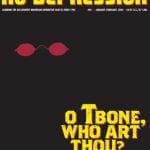Jolie Holland – To Be Good or not to be
In the beginning, Jolie Holland wanted to be David Garza.
Well, not exactly. But close. Growing up outside of Houston, Holland became smitten with Twang Twang Shocka Boom, the Texas combo fronted by Garza. “They were so clever and heartfelt,” she recalls. When Holland — who taught herself to play piano at age 6, then progressed to violin and guitar — began to write her own songs during her teenage years, she modeled them after Garza’s.
But not for long. When she was 15, some relatives from East Texas came to visit. After dinner one evening, Holland pulled out her guitar and played some of her poppy originals. The family response to her music was decidedly nonplussed. “It wasn’t country and it wasn’t Texan,” she says. Finally, one of her uncles spoke up: “C’mon, Jolie,” Holland drawls, imitating him. “Play something your Grandma’d like.”
Holland’s grandmother likes her debut disc, Catalpa, and not just because it was made by kin. The record’s blend of rural blues, jazz and country draws heavily on musical idioms from generations past. Small wonder that Holland, 28, named the album after a flowering tree, considering how often she refers to “deep roots” while discussing her art. “I’ve always gravitated toward classic concepts,” says Holland, who spent a chunk of her adolescence obsessing over Romantic English poetry.
Her influences encompass many genres and eras. Holland cites jazz icons Billie Holiday and Nina Simone, as well as blues great Blind Willie McTell, among her favorite singers (she gives McTell a lyrical nod on Catalpa’s opener, “Alley Flowers”). Her own vocal delivery is direct and low-key, so that the slightest nuances within her performances stand out in relief.
Holland credits Mississippi John Hurt for shaping her guitar playing. “I had tried to pick before, but it always sounded so bad to me,” she explains. “Then I just listened to him one day, and I was like, ‘Wow, I can play this!'”
“I’m really absorbent when it comes to music,” she adds. “I’ve never had any formal training, so for me, it’s all about listening closely and sucking it in: What’s that ornamentation about? What makes it different from other types of ornamentation?”
But she also appreciates that when you bring an established aesthetic or discipline into a new place or time, it often evolves into something else — “like calypso musicians trying to play R&B, and winding up with reggae,” she observes.
Holland finished high school in 1994 and spent the next few years migrating between Austin and New Orleans, making music and living primarily out of a backpack. Eventually, wanderlust led her further west, and up north, first to San Francisco, and then Vancouver.
In 1997, with Samantha Parton and Trish Klein, she formed the original incarnation of the Be Good Tanyas, named after a song by Holland’s pal Obo Martin. Although she sings two tracks on the Tanyas’ 2001 debut Blue Horse — “The Littlest Birds” (which she re-recorded for Catalpa) and the traditional “Lakes Of Pontchartrain” — Holland didn’t stay with the group long.
“The Be Good Tanyas were not fun for me,” she admits. “I’ve worked in different collectives before. I can use constructive criticism. I’m used to there being consensus, and a way to get to consensus. And I felt like there wasn’t that kind of social cohesiveness there with the Tanyas. That made me nervous: ‘Wait a minute…we’re moving forward, but the gears don’t even fit together.’ So I was like, ‘I’m out of here. You guys can make it work.’ And they have.”
Holland is making it work on her own as well. She originally released Catalpa independently in early 2003 on a very limited basis; it was subsequently picked up by Epitaph imprint Anti and released to wider distribution in November. She and her band, drummer Dave Mihaly and guitarist Brian Miller, are working on a new album for Anti due out later this year.
Although her upcoming disc will be her second full-length, in some respects it will be more like her official debut. Catalpa was originally recorded as a series of informal demos intended for fellow musicians; only later was it assembled into a cohesive CD by her neighbor, sound engineer Chris Arnold. It wasn’t intended for mass consumption.
“I always used to tell people, ‘You know it’s a piece of shit, right?'” she chuckles. But listeners disagreed. Tom Waits even nominated Catalpa for the Shortlist Award, which annually recognizes records deserving notice for creativity regardless of commercial impact.
What is it fans are responding to? “There’s a lot of this pretty-boy, big-studio Americana right now, and it just sounds so gross and fake,” Holland claims. “People want to hear something that’s honest. Catalpa represents the sound of me going, ‘Hey, I’ve got this song, check it out.’ I was just playing for my friends, people who I have really high esteem for, so there’s a lot of love there.”




